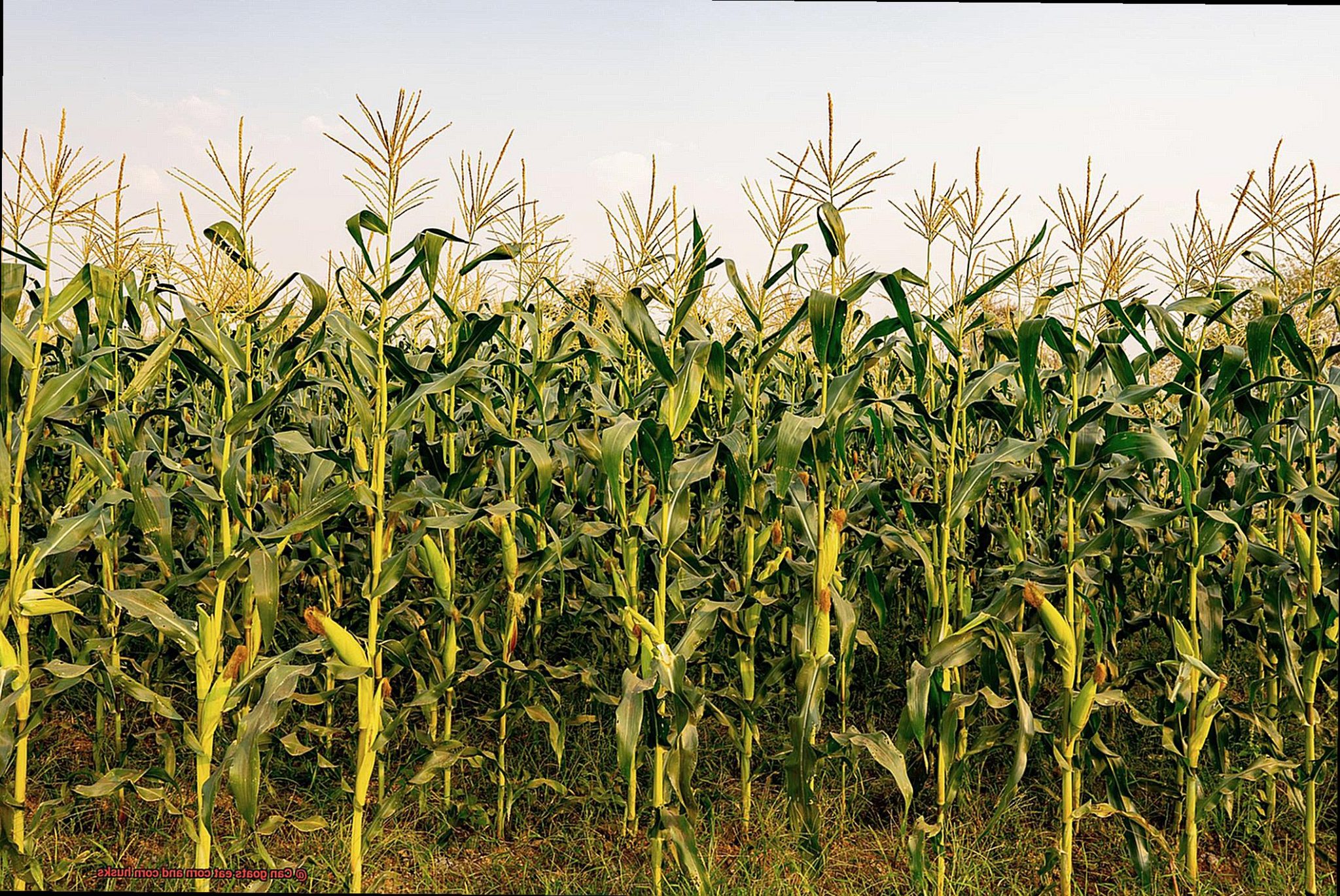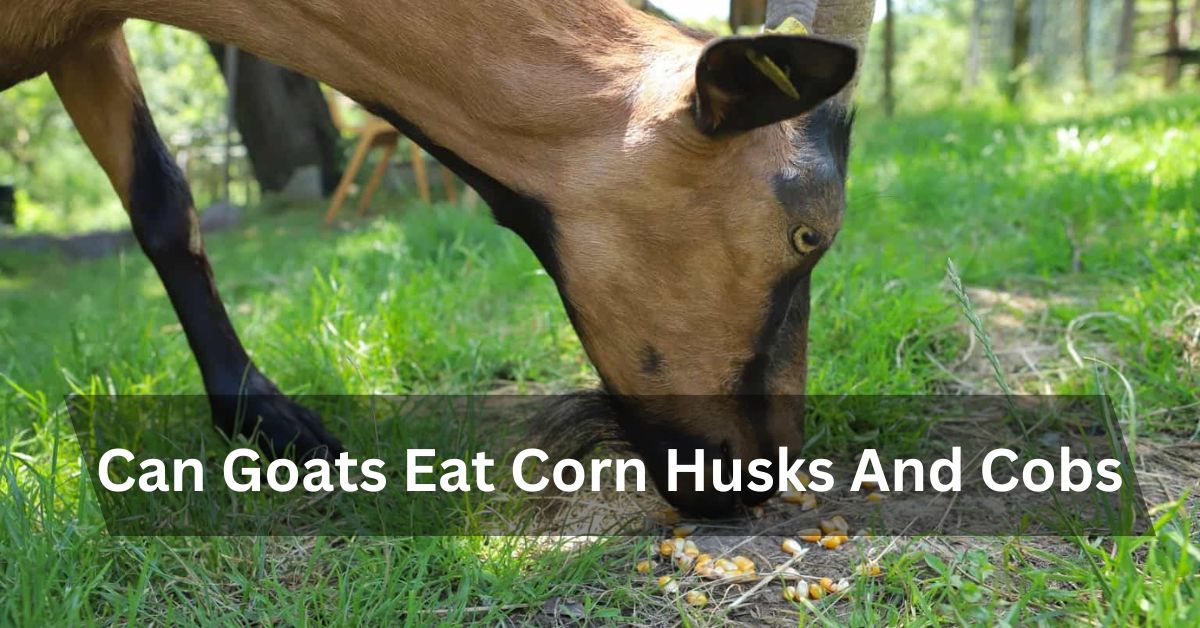Goats are curious creatures with a penchant for munching on various plants and materials, but not everything is safe or healthy for them to consume. If you're a goat owner or enthusiast, you may have wondered, "Can goats eat corn husks?" This article will provide a detailed exploration of this topic, ensuring that you make informed decisions about your goats' diet.
Corn husks are a byproduct of corn farming, and many livestock owners wonder whether they can serve as a viable food source for their animals. While goats are known for their robust digestive systems, it's crucial to understand the nutritional value and potential risks of feeding them corn husks.
In this guide, we'll delve into the dietary needs of goats, the safety of corn husks, and how they fit into a balanced diet. Whether you're a seasoned goat farmer or just starting out, this article will provide you with the knowledge you need to make the right choices for your goats.
Read also:Andrea Russett And Zane Hijazi A Journey Of Passion Business And Philanthropy
Table of Contents
- Understanding the Dietary Needs of Goats
- Are Corn Husks Safe for Goats?
- Nutritional Value of Corn Husks
- How Goats Digest Corn Husks
- Tips for Feeding Corn Husks to Goats
- Potential Risks of Feeding Corn Husks
- Alternatives to Corn Husks
- Expert Advice on Goat Nutrition
- Frequently Asked Questions
- Conclusion
Understanding the Dietary Needs of Goats
Goats are ruminant animals with complex digestive systems that allow them to process fibrous plant materials efficiently. Their diet should consist of a balanced mix of hay, grass, grains, and supplements to ensure optimal health. However, it's important to note that not all plant materials are suitable for goats.
Hay and Forage: These should form the foundation of a goat's diet, providing essential fiber and energy. High-quality hay is particularly important for maintaining digestive health.
Grains: While grains can supplement a goat's diet, they should be given in moderation to avoid digestive issues. Overfeeding grains can lead to acidosis, a condition that disrupts the pH balance in the rumen.
Benefits of a Balanced Diet
- Improved overall health and vitality
- Enhanced milk production in dairy goats
- Better resistance to diseases and parasites
- Healthy growth and development in young goats
Are Corn Husks Safe for Goats?
Corn husks, the outer protective layer of corn kernels, are generally safe for goats to consume in moderation. However, there are a few factors to consider before adding them to your goat's diet:
Quality of Corn Husks: Ensure that the corn husks you use are clean and free from mold or pesticides. Moldy husks can cause digestive issues or even toxicity in goats.
Portion Control: Corn husks should not make up the bulk of your goat's diet. They lack the essential nutrients found in hay and grains, so they should only be offered as an occasional treat.
Read also:Emily Saliers Partner A Deep Dive Into The Life And Partnership Of An Iconic Musician
Safety Considerations
- Avoid feeding moldy or contaminated husks
- Introduce corn husks gradually to prevent digestive upset
- Monitor your goats for any adverse reactions
Nutritional Value of Corn Husks
Corn husks are primarily composed of cellulose, hemicellulose, and lignin, which are fibrous materials that goats can digest with the help of their rumen microbes. While they are low in nutritional value compared to hay or grains, they can still provide some benefits:
Fiber Content: Corn husks contribute to the fiber intake of goats, which is essential for maintaining a healthy digestive system.
Low-Calorie Option: If you're looking to manage your goat's weight, corn husks can serve as a low-calorie filler in their diet.
Comparison with Other Feed Options
Compared to hay, corn husks have lower protein and mineral content. For instance, alfalfa hay contains approximately 16-18% protein, while corn husks typically have less than 5% protein. This makes them a poor substitute for high-quality forage.
How Goats Digest Corn Husks
Goats have a unique four-chambered stomach that allows them to break down fibrous plant materials effectively. When a goat consumes corn husks, the process begins in the rumen, where microbes ferment the fibrous components.
Rumen Fermentation: The microbes in the rumen convert cellulose and hemicellulose into volatile fatty acids, which are absorbed into the bloodstream and used as an energy source.
Efficiency: While goats can digest corn husks, the process is less efficient compared to digesting high-quality forage like alfalfa or timothy hay.
Improving Digestive Efficiency
- Ensure goats have access to clean water to aid digestion
- Provide a balanced diet to support rumen health
- Monitor goats for signs of digestive issues, such as bloating or diarrhea
Tips for Feeding Corn Husks to Goats
If you decide to incorporate corn husks into your goat's diet, follow these tips to ensure safe and effective feeding:
Start Small: Introduce corn husks gradually to allow the goats' digestive systems to adapt. Begin with a small handful and increase the amount over time if no adverse effects are observed.
Combine with Other Foods: Offer corn husks as part of a varied diet that includes hay, grains, and fresh vegetables. This ensures that goats receive all the necessary nutrients.
Best Practices for Feeding
- Store corn husks in a dry, cool place to prevent mold growth
- Inspect husks for contaminants before feeding
- Provide fresh water at all times to aid digestion
Potential Risks of Feeding Corn Husks
While corn husks are generally safe for goats, there are some risks to be aware of:
Mold Toxicity: Moldy corn husks can produce mycotoxins that are harmful to goats. Symptoms of mycotoxin poisoning include lethargy, weight loss, and neurological issues.
Choking Hazard: Large pieces of corn husks can pose a choking risk if goats swallow them without chewing properly. Always ensure that husks are broken into smaller, manageable pieces.
Preventing Risks
- Regularly inspect corn husks for signs of mold
- Shred or chop husks into smaller pieces before feeding
- Monitor goats closely when introducing new foods
Alternatives to Corn Husks
If you're looking for alternative feed options for your goats, consider the following:
Hay: High-quality alfalfa or timothy hay provides essential fiber, protein, and minerals.
Grass: Fresh pasture grass is an excellent source of nutrients and promotes natural grazing behavior.
Fruits and Vegetables: Treats like apples, carrots, and pumpkins can add variety to your goat's diet while providing additional vitamins and minerals.
Recommendations for Alternatives
- Rotate feed options to prevent boredom and nutritional imbalances
- Consult with a veterinarian or livestock nutritionist for personalized advice
- Monitor goats' health and adjust their diet as needed
Expert Advice on Goat Nutrition
According to Dr. Susan Smith, a veterinarian specializing in livestock nutrition, "Goats thrive on a balanced diet that includes a mix of high-quality forage, grains, and supplements. While corn husks can be used as an occasional treat, they should not replace the core components of a goat's diet."
Key Takeaways: Prioritize nutritional diversity, monitor your goats' health closely, and consult with experts when in doubt. A well-rounded diet is the foundation of healthy goats.
Resources for Further Reading
- National Research Council: Guidelines for goat nutrition
- Food Safety Authority of Ireland: Safe feeding practices for livestock
Frequently Asked Questions
Can goats eat corn husks every day?
While goats can eat corn husks occasionally, they should not be fed daily. Corn husks lack the essential nutrients found in hay and grains, so they should only be offered as a treat in moderation.
Are there any health benefits to feeding corn husks?
Corn husks provide fiber, which supports digestive health. However, they are not a significant source of protein, vitamins, or minerals, so their benefits are limited compared to high-quality forage.
What should I do if my goat eats moldy corn husks?
If you suspect your goat has consumed moldy corn husks, contact your veterinarian immediately. Symptoms of mold toxicity include lethargy, loss of appetite, and neurological issues. Prompt treatment is essential to prevent complications.
Conclusion
In conclusion, goats can eat corn husks in moderation as part of a balanced diet. While they are safe and provide some fiber, they should not replace the core components of a goat's diet, such as hay and grains. Always ensure that corn husks are clean, free from mold, and chopped into manageable pieces to minimize risks.
We encourage you to share your thoughts and experiences in the comments below. Have you tried feeding corn husks to your goats? What other feed options have worked well for you? Don't forget to explore our other articles on goat care and nutrition for more valuable insights!


